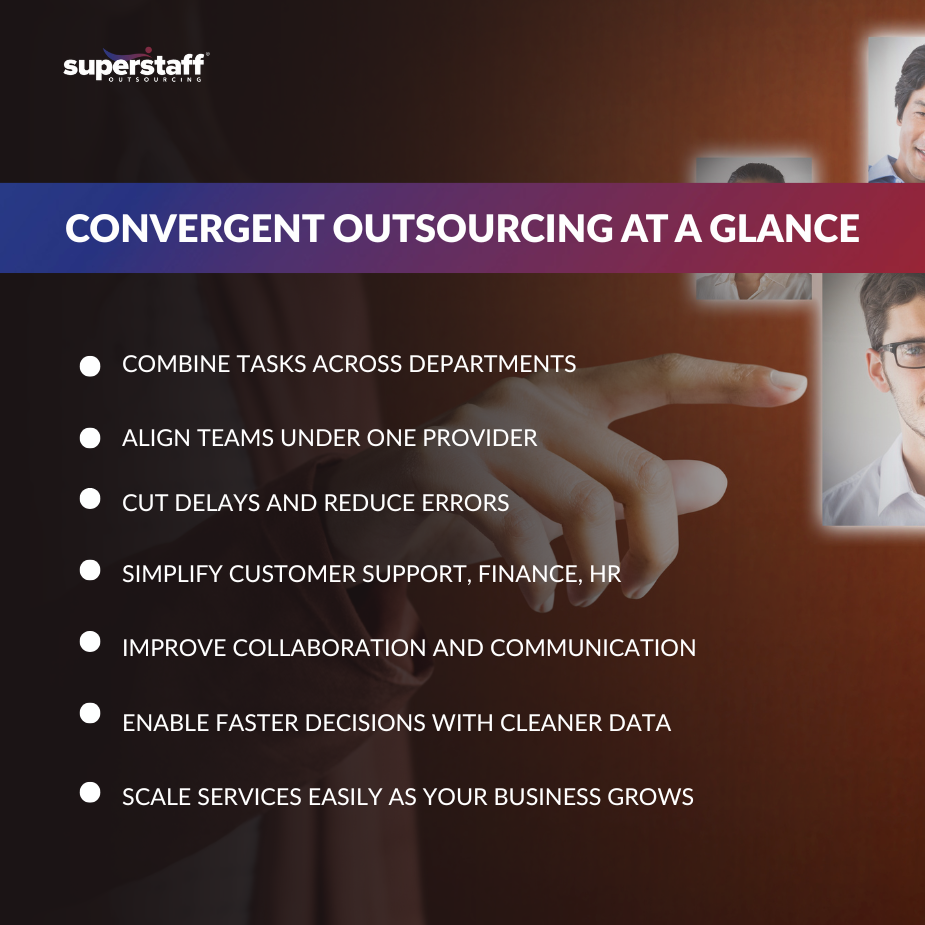
Business growth often creates complexity. As departments expand, processes become fragmented. Teams end up working in silos, leading to miscommunication, inefficiencies, and rising costs. This kind of disjointed setup makes it harder for companies to scale efficiently.
Convergent outsourcing offers a way forward. Instead of assigning different functions to different vendors or managing them in-house, businesses can consolidate multiple services through a single outsourcing partner. This approach improves coordination, reduces administrative burdens, and helps teams stay aligned with common goals. The result is a more agile and connected organization that can focus on performance instead of juggling disconnected tasks.
In this article, we explore how convergent outsourcing brings together different business functions for smoother operations. From back office outsourcing services to outsourced quality assurance, each piece fits into a bigger strategy that supports growth and efficiency.

How Fragmentation Slows Business Performance
When companies grow, complexity often follows. Separate tools, workflows, and vendors can slow teams down.
1. Siloed Workflows Create Delays
When departments operate on separate systems or platforms, coordination becomes difficult. Sales may not have access to updated product data. Customer service might be left out of the loop on order fulfillment issues.
2. Too Many Vendors, Too Many Gaps
Managing multiple outsourcing vendors across different functions can lead to misaligned priorities. Instead of working together, each provider may only focus on its own task.
3. Data Inconsistency
Different systems often mean inconsistent data. Manual updates or conflicting entries lead to reporting errors, duplicated tasks, and decision-making delays.
4. Repetitive Admin Work
Without a unified approach, admin tasks pile up. Employees spend hours cross-checking data, following up with different teams, and trying to fix process gaps.
5. Limited Visibility
Leaders can’t always track performance across different units. This makes it hard to assess overall business health, forecast accurately, or spot risks early.
What Convergent Outsourcing Offers
Convergent outsourcing simplifies operations by bringing multiple functions under one umbrella. It helps businesses run smoother without adding internal complexity.
1. Centralized Service Delivery
All services run through one outsourcing partner. From customer support to data entry and finance tasks, every process connects. This setup makes it easier to manage performance and track results.
2. Consistent Workflows Across Teams
One partner means standardized processes. Teams follow unified workflows, which boost consistency, reduce handoff errors, and improve output quality.
3. Better Communication and Collaboration
Since services are managed under one roof, communication becomes faster. Different functions can share information and resolve issues without jumping between multiple vendors or systems.
4. Seamless Data Flow
With integrated systems, data moves more freely between departments. Reporting becomes accurate, real-time, and reliable.
5. Easier Scalability
Convergent outsourcing offers flexible scaling. You can quickly add more support in areas like customer service, billing, or technical support, depending on seasonal needs or business changes.
Key Business Functions Unified Through Convergent Outsourcing
Many essential operations can be combined and managed through convergent outsourcing. Below are areas that benefit the most.
1. Customer Support and Help Desk
Support teams are often the frontline of your brand. Combining phone, email, chat, and technical assistance in one outsourced setup helps ensure consistency in service delivery.
2. Finance and Accounting
Accounts receivable, payable, payroll, and reconciliations can be streamlined. Convergent outsourcing brings all these tasks into one process flow, reducing errors and ensuring timely reporting.
3. Back Office Outsourcing Services
Data entry, document processing, transcription, and record management are prime candidates. When these tasks are handled together, accuracy improves, and turnaround times shorten.
4. Human Resource Support
Tasks such as employee onboarding, record maintenance, and compliance tracking can be unified. This improves hiring timelines and helps maintain clean documentation.
5. Outsourced Quality Assurance
Combining quality monitoring with service delivery ensures consistent performance. Outsourced quality assurance teams can provide unbiased reviews and detailed feedback that improve team productivity and customer satisfaction.
Real-World Benefits for Growing Businesses
Companies that adopt convergent outsourcing often report faster results, improved team performance, and better customer experiences.
1. Reduced Administrative Costs
Managing one vendor for several services cuts down overhead. There’s no need for multiple contracts, billing systems, or account managers.
2. Better Use of Internal Talent
In-house teams can focus on strategic work while repetitive tasks are handled externally. This helps boost employee engagement and productivity.
3. More Accurate Forecasting
Convergent outsourcing provides a clear overview of all operations. With clean data and transparent reporting, companies can forecast needs and make smarter decisions.
4. Consistent Service Quality
Standardized training and monitoring help keep service quality high. Customers get the same level of support across all touchpoints.
5. Faster Response to Market Changes
Outsourcing partners can adjust quickly to demand changes, helping businesses stay competitive without adding internal pressure.
Building a Long-Term Partnership With a Convergent Outsourcing Provider
Not all providers offer integrated services. Choosing the right partner ensures long-term value.
1. Evaluate Service Breadth
Look for a provider that covers multiple functions under one delivery model. This allows for better coordination and a stronger partnership.
2. Review Onboarding and Transition Processes
A clear transition plan is important. Choose a provider with proven methods for onboarding teams and integrating with your systems.
3. Check Communication Protocols
Strong reporting systems and regular updates are key. Choose a partner that prioritizes transparency and open communication.
4. Ask About Technology Tools
Integrated platforms make convergent outsourcing more effective. Make sure the provider uses reliable tools that support real-time collaboration and tracking.
5. Monitor Results
Regular performance reviews help keep services aligned with your goals. The right partner will work with you to optimize processes and improve results over time.
Smarter Growth Through Unified Outsourcing
Outsourcing is no longer just about cutting costs. Convergent outsourcing gives growing companies a structured way to simplify workflows, eliminate silos, and improve business outcomes. With the right approach, outsourcing can unify back office outsourcing services, customer support, outsourced quality assurance, and more.
Let SuperStaff help you bring your operations together. Our convergent outsourcing model connects your teams, reduces process gaps, and supports your goals with flexible, scalable services tailored to your business.
Unify Workflows, Simplify Operations, Scale Smarter
SuperStaff helps businesses grow through convergent outsourcing. Whether you need support in back office operations, customer experience, or quality assurance, we provide end-to-end solutions built for efficiency and scale.
Reach out today to discover how a unified outsourcing strategy can support your goals.






